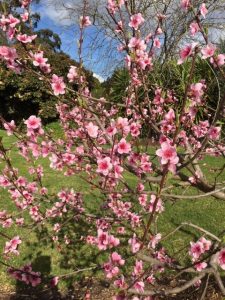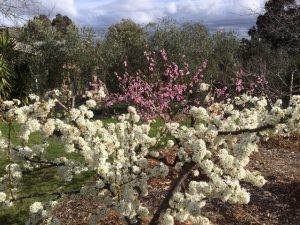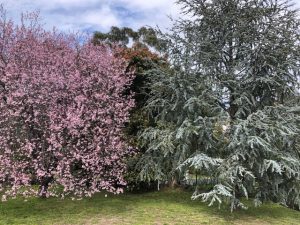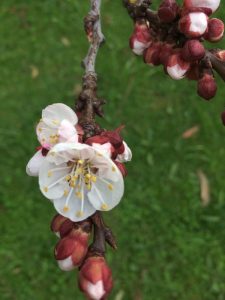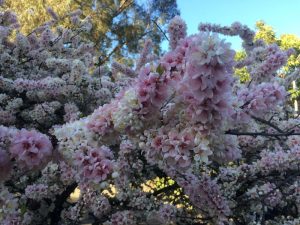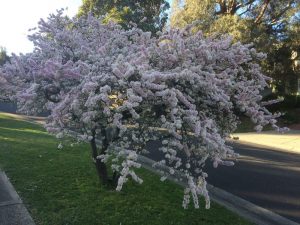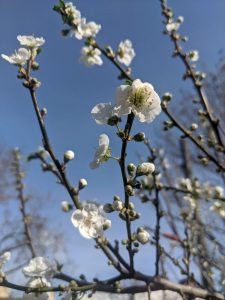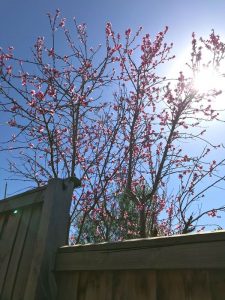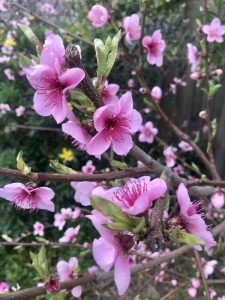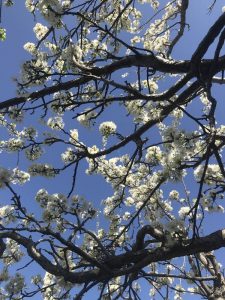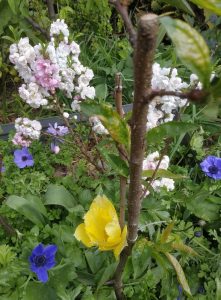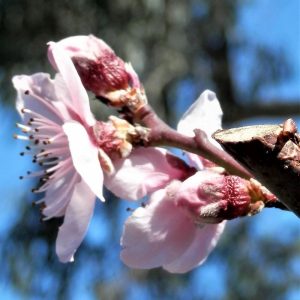Thanks to all the people who have contributed to this week’s newsletter: Ann Stanley, Catherine Mortimer, Cathy Romeo, Choon Yin Yeok, Chris Kent, Chris Tankard, Dan Ross, Dave Chambers, Deb Thomson, Doris Glier, Elizabeth Doig, Karin Motyer, Katrina Forstner, Kirsty Bishop-Fox, Louise Currie, Megan Goodman, Pam Jenkins, Pam Rowley, Paula Mcleod, Peter Bevz, Rebecca Haschek, Rita Varrasso, Sam Dixon, Soo Mei Leong and Vicki Paras.
What farmers’ markets will be happening this weekend?
On Saturday: Coburg and Collingwood Children’s Farm (relocated to Carlton North).
On Sunday: Alphington and Eltham. Not Whitehorse.
Eltham Farmers’ Market publishes a regular newsletter – sign up here. Melbourne Farmers Markets (who run the Alphington, Coburg and Collingwood farmers’ markets) also publish a regular newsletter – sign up here.
Pam has produced a video on alternative greens
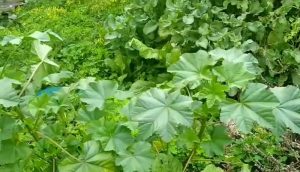 As Pam Jenkins says in the introduction to her video, “Variety being the spice of life, let’s talk about some alternative winter green vegetables that may well just show up, uninvited, in your garden. They may be classed as weeds or they may just be growing in an inappropriate place.” She then goes on to discuss:
As Pam Jenkins says in the introduction to her video, “Variety being the spice of life, let’s talk about some alternative winter green vegetables that may well just show up, uninvited, in your garden. They may be classed as weeds or they may just be growing in an inappropriate place.” She then goes on to discuss:
- Chickweed: can be cooked or eaten raw in a salad.
- Mallow: can be used as a substitute for spinach or as a soothing tea.
- Parsley.
- Three cornered leeks: can be used as a substitute for spring onions.
- Warrigal greens: another substitute for spinach.
As a bonus, Pam has also provided a recipe which combines all of the above into a tasty dish of greens which she calls “a wild version of Staffordshire frying greens“.
Watch the video and read the accompanying words.
Sugarloaf Produce
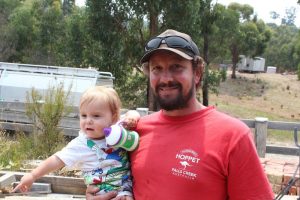 Ann Stanley has written a short article about Sugarloaf Produce (pdf). Sugarloaf Produce, who are based in Strathewen, grow a wide variety of vegetables plus mushrooms and eggs. You can buy their produce at Eltham Farmers’ Market and at some of the markets run by Melbourne Farmers Markets (Abbotsford Convent, Carlton and Collingwood). The picture is of farmer Warren Mckimmie and his young son Felix.
Ann Stanley has written a short article about Sugarloaf Produce (pdf). Sugarloaf Produce, who are based in Strathewen, grow a wide variety of vegetables plus mushrooms and eggs. You can buy their produce at Eltham Farmers’ Market and at some of the markets run by Melbourne Farmers Markets (Abbotsford Convent, Carlton and Collingwood). The picture is of farmer Warren Mckimmie and his young son Felix.
This is the second of Ann’s articles about Eltham Farmers’ Market stallholders, the first one being about Apted’s Orchards (pdf).
Growers, seed savers or land wanted in the Eltham area
Seeds of Plenty is an Eltham-based online seller of untreated, non-GMO, heirloom, open pollinated and select hybrid seeds, including a lot of vegetable and herb seeds. Its owner is newsletter reader Dan Ross.
Dan is looking for people in the Eltham area who could help him with growing some crops for seed this summer, particularly dwarf tomatoes, some modern black indeterminates and possibly some chillies. If you have some available land for rent, or if you are interested in growing crops yourself, Dan would love to hear from you. The land would need plenty of sun and access to water. Plants could be grown in the ground or, if the soil is poor, in planter bags. You don’t need to be an expert grower, just willing to have a go. Dan will reimburse your watering costs and negotiate a price for the final crop/seed. He will be starting the seedlings soon, ready for transplanting out around early November. They will then stay in the ground until around April next year. If potentially interested, call Dan on 0422 431 958 to discuss.
In passing, Dan started building his own veggie garden in 2019 and has recently published an interesting article on how he went about it. He is also currently publishing weekly blog posts on various aspects of veggie growing.
Interested in wine making?
The Eltham and District Winemakers Guild has been publishing monthly newsletters for many years. All of these newsletters are available on their website. In recent months, these newsletters have included interviews with notable local winemakers under the heading my vintage year. August’s interview was with Ken King, from Kings of Kangaroo Ground. July’s interview was with Karen Coulston, from Yarrambat, who has worked over the years with many of the local wine makers.
The leek harvest is underway
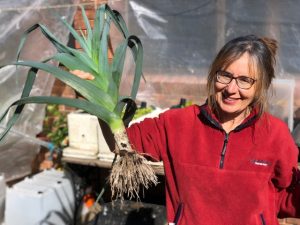 A few months ago, courtesy of Bruno Tigani, we gave away a lot of leek seedlings. Cathy Romeo has written in: ““Our first harvest of the leeks that you gave us. They are fabulous looking plants – better than the ones you get in the shops! And no food miles. Going to have a cook up this evening.“
A few months ago, courtesy of Bruno Tigani, we gave away a lot of leek seedlings. Cathy Romeo has written in: ““Our first harvest of the leeks that you gave us. They are fabulous looking plants – better than the ones you get in the shops! And no food miles. Going to have a cook up this evening.“
Yes, you did know!
White-winged choughs eating fruit
Last week, Lyn Richards asked whether anyone had any evidence of white-winged choughs eating fruit. Louise Currie has responded: “According to The Handbook of Australian, New Zealand and Antarctic birds, Vol 7, part A, pages 777–779. Food: mainly insects and seeds, but also other invertebrates, fruit, shoots and plant tubers. Behaviour: forage almost solely on the ground, among leaf litter and soil (one study showed 99.6% on ground, another 100%). Citrus is not specifically mentioned. I wonder whether it was windfalls that they were eating, not fruit on the tree, or maybe they could knock Lyn’s tangelos from the tree and then eat them on the ground.“
Injera flatbread
Two weeks ago, Susan Faine asked where she could buy injera flatbread near Doncaster. Catherine Mortimer has responded: “Injera flatbread is easy to make with three ingredients and a non-stick frying pan. I have only ever made it myself (or eaten it in a restaurant) and have never seen it sold anywhere. I would be happy to send a recipe or show someone online if they need.“
Deterring rats without using poison
Two weeks ago, Annelise Tedesco asked how to deter rats without using poison. Lots of people have now answered.
Katrina Forstner: “If the rats are in the compost bins, you can do a few things. 1. Pop some neighbour’s bokashi bin contents in as the fermented scraps is something they abhor. 2. Use galvanised aviary wire on the bottom of the bin (although I’ve seen determined rats still get through). 3. Mix your compost regularly, give it a loud tap every time that you go past and water the compost from time to time. I’ve heard (though not tried) that opened containers of toothpaste deter rats. Finally, I protect my edible plants with upcycled freezer baskets that I’ve found in hard rubbish, plus I’ve recently found that aviary cages are perfect with their small gauge or mesh.“
Pam Rowley: “I have used rat traps bought from hardware shops effectively. The problem is disposing of the caught rats.“
Peter Bevz: “There are many YouTube clips using a large (usually glass) bowl filled with olive oil, sometimes with a ‘walking plank’ with a food lure overhanging the oil. The plank collapses and the mice/rat can’t get out because it’s too slippery.“
Sam Dixon: “Place orange nets of cat hair around the garden. This also deters possums.“
Do you know?
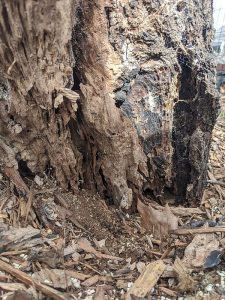 Jo Buckle asks: “What is this big patch of dry rot at the base is my apricot tree (see picture)? Do you know of a fruit tree specialist who night be able to help with it?“
Jo Buckle asks: “What is this big patch of dry rot at the base is my apricot tree (see picture)? Do you know of a fruit tree specialist who night be able to help with it?“
Some guidance on ‘pest animals’
Nillumbik Council has a page with guidance on what it calls ‘pest animals’. According to the Council, these comprise Queensland fruit fly, rabbits, deer, Indian mynas, European wasps, honey bees, rats, mice and Australian magpies (Editor: Australian magpies but not noisy miners?). Thanks for the heads up, Deb Thomson!
Hey kids … Let’s germinate some seeds!
Open Gardens Victoria have published a how to guide for children to germinate seeds in either egg cartons or egg shells.
Guy’s food growing tips – guest contributions
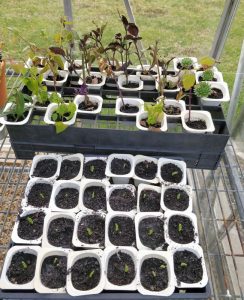 Following on Pollyn Chan’s tip last week to use takeaway food styrofoam containers to grow seedlings, Lyn Richards has written in: “Do your kids or grandkids consume yoghurt from small plastic pots? Don’t let them bin those little buckets! They are a perfect size for growing cuttings or seeds; just punch holes in the slightly rounded base. Cleaned after planting out, they also stack neatly for storage till next spring.” [See picture right.]
Following on Pollyn Chan’s tip last week to use takeaway food styrofoam containers to grow seedlings, Lyn Richards has written in: “Do your kids or grandkids consume yoghurt from small plastic pots? Don’t let them bin those little buckets! They are a perfect size for growing cuttings or seeds; just punch holes in the slightly rounded base. Cleaned after planting out, they also stack neatly for storage till next spring.” [See picture right.]
Read more newsletter reader tips.
Anyone else got any growing tips that they are willing to share? Email me.
Meg’s social isolation week
The peas and broad beans are finally starting to rocket away and they need ongoing support and tying in. I dig up the self-sown seedlings of lettuce, silverbeet and parsley and marshal them into order. I deal ruthlessly with the comfrey volunteers (straight to the compost). I divide the red-veined sorrel into smaller clumps and harvest the last of the cos lettuce (which will form a salad tonight).
My redcurrant cuttings taken a few months ago have now struck and I pot them up individually. I dig up some youngberries that have self-rooted along the stem (having lain on the ground and not been tied in) and cut them to form new plants and pot them up too. I am reminded that there is a jar of mixed berry jam from last season that requires using … maybe some almond jam drops?
Almond jam drop biscuits
125g butter
1 teaspoon vanilla
¾ cup caster sugar
2 egg yolks
⅔ cup almond meal
1⅓ cup plain flour
½ teaspoon baking powder
2 tablespoons of jam
Beat the butter and sugar until light. Add the yolks one at a time until just combined. Add the vanilla, almond meal, flour and baking powder and form a dough.
Roll into balls, flatten very slightly and make a small hollow in each. Fill hollow with jam.
Bake at 160degC for 20-25 minutes.
Note: If you are using homemade jam, combine the jam with a little lemon juice first to help it maintain is colour when baked.
Reader photos
Last week’s theme – blossom
13 photos were submitted.
This week’s theme – interesting summer crops
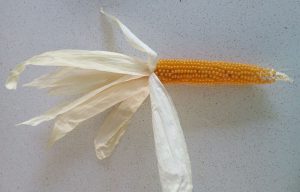 By now you should be planning, if not planting, your summer crops. The photo theme this week is ‘interesting summer crops’ which you will either be growing or would like to be growing. As ever, send me your interesting photos, together with a title and (if you want) a story, and I will publish them next week. Please submit any photos by end of play on Sunday at the latest.
By now you should be planning, if not planting, your summer crops. The photo theme this week is ‘interesting summer crops’ which you will either be growing or would like to be growing. As ever, send me your interesting photos, together with a title and (if you want) a story, and I will publish them next week. Please submit any photos by end of play on Sunday at the latest.
To get you started, here is a picture of a popcorn that I grew last summer and will certainly be growing this summer. Popcorn is a variety of sweetcorn which you leave to dry on the plant and from which you then make popcorn. A year’s harvest will last until the next year’s harvest so you can forever be with popcorn.
Which link was clicked most times in the last newsletter?
Fran Lennard’s article on healthy eating and sustainability.
Joke of the week
What food goes best with jacket potatoes? Button mushrooms.
Upcoming online events
If you know of any events other than those listed below, email me.
Newly announced events
Creative ways to reduce food waste at home: Saturday, 12th September, 2-3.30pm; free; Zero Waste Victoria. Read more and book on Humanitix.
A trip to Paris (thermomix): Tuesday, 15th September, 7.30-8.30pm; free; organised by Thelma and Louise Workshops. Read more and book on EventBrite.
Growing food in the workplace: Wednesday, 16th September, 3-4pm; free; organised by Darebin Council. Read more and book on EventBrite.
Pandemic gardening – a wish for tomorrow: Wednesday, 16th September, 7.15-9.15pm; $17; organised by Sustain. Read more and book on Humanitix.
The climate emergency & Nillumbik Shire – what’s the story: Saturday, 19th September, 2-3.30pm; free; organised by Nillumbik Climate Emergency Action Team.
Cooking up compost: Saturday, 3rd October, 2-3.30pm; free; organised by Zero Waste Victoria. Read more and book on Humanitix.
Onion and potato bhaji and chutney: Saturday, 3rd October, 4-5.30pm; $29; organised by Cook Indian by the Creek. Read more and book via Facebook.
Lamb bhuna masala: Saturday, 10th October, 5-6.30pm; $35; organised by Cook Indian by the Creek. Read more and book via Facebook.
Chicken biryani: Friday, 16th October, 5-6.30pm; $35; organised by Cook Indian by the Creek. Read more and book via Facebook.
Previously announced events
Home composting for beginners: Wednesday, 9th September, 7-8pm; free; organised by Edendale. Read more and book on WeTeachMe.
Sourdough bread making: 2 occurrences – 12th September 11am-midday and 13th September 3-4pm; $20; organised by Living & Learning Nillumbik. Read more and book on their website.
Complete guide to home composting: Saturday, 12th September, 2-4pm; $50; organised by CERES. Read more and book on Humanitix.
Samosa and mint chutney: Saturday, 12th September, 6-6.30pm; $29; organised by Cook Indian by the Creek. Read more and book via Facebook.
Introduction to backyard bees: Sunday, 13th September, 3-5pm; free; organised by Edendale. Read more and book on WeTeachMe.
Lamb vindaloo: Saturday, 19th September, 5-6.30pm; $35; organised by Cook Indian by the Creek. Read more and book via Facebook.
Chooks 4 families & kids: Saturday, 26th September, 10-11.30am; $10; organised by Edendale. Read more and book on WeTeachMe.
Growing microgreens: Saturday, 26th September, 11am-midday; $25; organised by SGA. Read more and book on WeTeachMe.
Flatbread parantha and raita: Saturday, 26th September, 5-6.30pm; $29; organised by Cook Indian by the Creek. Read more and book via Facebook.
Biodiversity and sustainable food systems: Wednesday, 30th September, 10.30am-2.30pm; $120; organised by CERES. Read more and book on Humanitix.
Wonderful world of worms for kids: Thursday, 1st October, 3-4pm; free; organised by Edendale. Read more and book on WeTeachMe.
Queensland fruit fly for home gardeners: Monday, 5th October, 7-8.30pm; free; organised by Edendale. Read more and book on WeTeachMe.
Backyard chooks for beginners: Saturday, 10th October, 10-11.30am; $10; organised by Edendale. Read more and book on WeTeachMe.
Open Table offer their weekly no waste cook club workshops free and online on Saturdays. As well as cooking (which is actually optional), you will learn about food waste and composting. Register on EventBrite.
All The Dirt is a weekly podcast about gardening.

